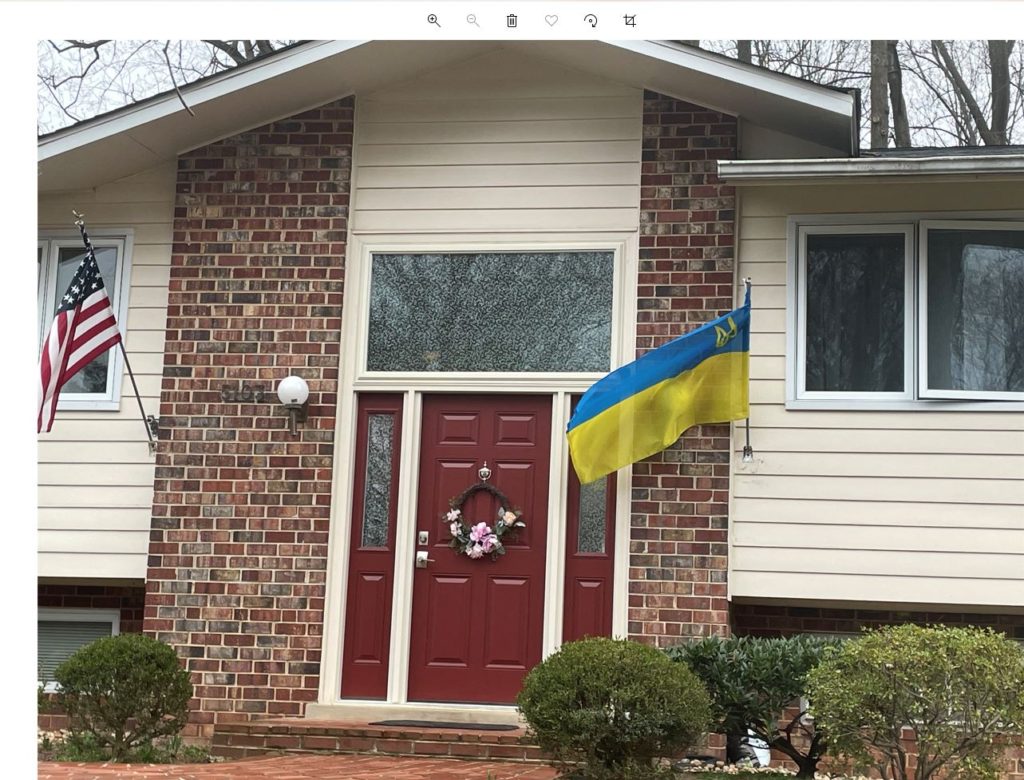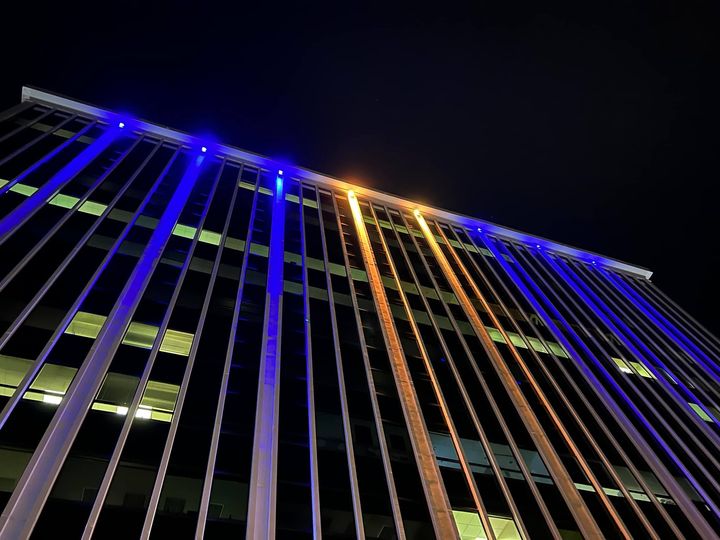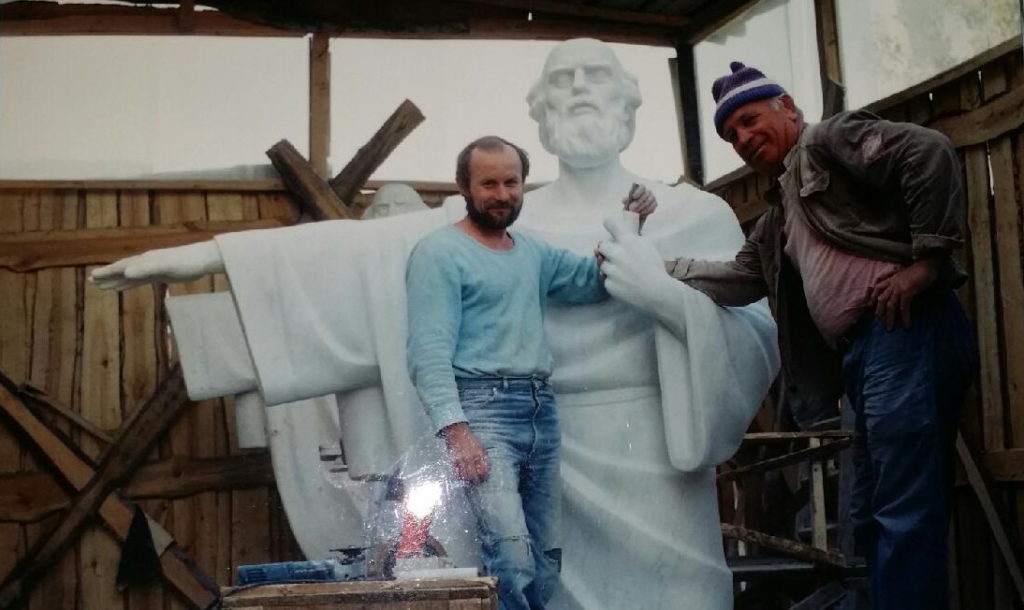Local Ukrainian Americans worried about folks back home

Three Ukrainian Americans contacted by Annandale Today are stressed out, barely able to sleep, and worried about their relatives back home, as the brutal invasion by Russia continues.
Marina Bayduk a resident of Springfield, is extremely concerned about her family in Ukraine. After watching the news, she woke up family members in Kyiv in the middle of the night on Feb. 24 to urge them to go to a bomb shelter. They’ve been in the shelter for almost an entire week.
Her mother, sister, and uncle have since evacuated to western Ukraine and hope to cross the border to Poland. Her father a doctor, remains at his hospital in Kyiv.
A very good friend of hers was killed a few days ago. He was staying in Anna’s grandmother’s house in the country when a rocket flew through a window and severely wounded him. His wife couldn’t get him to a hospital after the shelling started again, so they stayed in the basement. By the time it was safe to get out, it was too late.
An ‘insane war’
“It’s an absolutely insane war,” Bayduk says. The Russians are killing civilians and children. People trying to escape on an evacuation route with a white flag on their cars are being shot.
“There is no justification for that. Their objective is to destroy Ukraine,” she says. “Food is scarce, there is no water, no power, and there is nothing to buy.”

She calls Vladimir Putin “a war criminal and a terrorist” who “needs to be punished severely.” He is threatening the world with nuclear weapons. If the U.S. and NATO don’t establish a no-fly zone, “the loss is going to be unbearable.”
Originally from Kyiv, Bayduk moved to the U.S. in 1997. She is a biology professor at Georgetown University.
She co-founded an organization called United Help Ukraine in 2014 after Russia invaded Crimea. It focuses on collecting donated medical supplies, first aid kits, and other humanitarian aid.
Bayduk offers what she calls an “optimistic view” of the war: “I’m absolutely sure Ukraine is going to prevail and will stand its ground and defend its territory. Unfortunately, a lot of people will sacrifice their lives. The price will be too high.”
So much fear
Olena Sytnik of Annandale is worried about her father and his wife in the Ukrainian countryside. Her nephew and his wife spent days hiding in a cellar without electricity as “Russian tanks literally drove in front of the house.”

The Ukrainians bombed a bridge nearby to prevent the tanks from crossing, but that cut off access to a grocery store. Her relatives were able to get hold of some preserved pork and mushrooms. What little they have they’re sharing with Ukrainian soldiers.
“People are pulling together, they’re sharing food,” Sytnik says.
Everyone turns off their lights at night, covering their windows, and removing lights along the highway. To keep warm as they shelter in the basement, her relatives are using a blanket with an American flag and the Statue of Liberty on it that she brought on her last visit several years ago.
Sytnik was born in Kyiv but has lived in the U.S. for nearly 30 years.
When she was a child, she used to bring flowers to a big memorial near her old apartment building that honors Jews and others who died during World War II. The Russians bombed it, she says.
They also bombed a children’s hospital, while the children huddled in the basement, and destroyed the daycare center her older children attended. Fortunately, it wasn’t occupied at the time.
A Russian tank ran over a vehicle a few yards from her former home. The man inside survived, thanks to the Ukrainian civilians who came to his aid.
Sytnik hasn’t been sleeping and is “very terribly worried.” When she saw the news about the biggest nuclear plant in Europe being attacked, “I was shaking. It’s very stressful.” She blasts the Russians for using bombs prohibited by NATO that causes a lot of damage.

Sytnik keeps trying but so far hasn’t been able to connect with her relatives in the Donbas region in the southeastern part of Ukraine.
And she has no idea what happened to her friend, and the friend’s son and 84-year-old mother in Kharkiv, which sustained heavy bombing.
A no-fly zone would help
Anna Yabluchanksa, a resident of the Kings Park West community in Fairfax, is extremely worried about her grandmother, aunts, and uncles in Ukraine.
Some of them moved to the Western part of the country, but still, “no one is safe there,” she says. She hasn’t slept much since the war started.
A friend sheltering near Kyiv told her by text there was heavy shelling in the area and the walls were shaking.
Yabluchanksa, who’s been in the U.S. for five years, was born in Donetsk one of the two separatist regions in eastern Ukraine whose leaders are backed by Russia.
She went to school in the city of Kharkiv, beginning in the first grade and earned a medical degree from the University of Kharkiv. Yabluchanksa has heard from former classmates still in the city hiding underground.
She’s currently working as a researcher while raising 10-year-old triplets.
“We definitely feel support from the whole U.S. – from the people and from the government,” she says.
The number-one thing she wants from the U.S. government is to designate a no-fly zone, she says. “We don’t want American troops, but we do need weapons to shoot down Russian missiles.”
“Everything is coming too late,” Yabluchanksa says. If sanctions had been imposed against Russia and weapons had been sent to Ukraine earlier, that would have been a big help.
When Volodymyr Zelensky was elected president in 2019, “he was not a politician; he was a showman who came to politics,” and didn’t have the support among the population that he does now, she says. During the buildup to the invasion, “He really united the nation. Now, he’s a national leader who helped raise Ukrainian self-consciousness.”
Putin, on the other hand, is “pure evil,” she says. “There is no way to understand why he’s doing what he’s doing. But it doesn’t matter what we think. He’s come too far. There’s no way for him to back down.”
American aid appreciated
Yabluchanksa encourages people who want to help Ukrainians to consider providing medical supplies, such as bandages, catheters, needles, surgical equipment, first aid supplies, and tourniquets. After putting out a request for donations on Nextdoor, she received 32 packages the next day.
Yabluchanksa is repacking the donations and sending them to Ukraine via an organization called Meest that provides free shipping. “Meest” means “bridge” in Ukrainian.
“Thank you to everyone; it’s really amazing how people respond,” she says. “I really feel people care.”

I have donated twice. The towns my grandparents came from are now in Ukraine – Shpikiv and Sokolivka. I am distraught by this war. I pray for the people of Ukraine every night.
I’m concerned about my folks at home, and they’re in Florida. Yet I don’t insist people wave Florida state flags and subsidize their mortgages. There’s suffering all over the world, and constant war raging in the Middle East and Africa. I feel sorry for Ukrainians and for people who buy the government’s and media’s instructions for what we should do and how we should feel. Our government caused this crisis by dangling NATO membership on Russia’s border. Remember the bay of pigs?